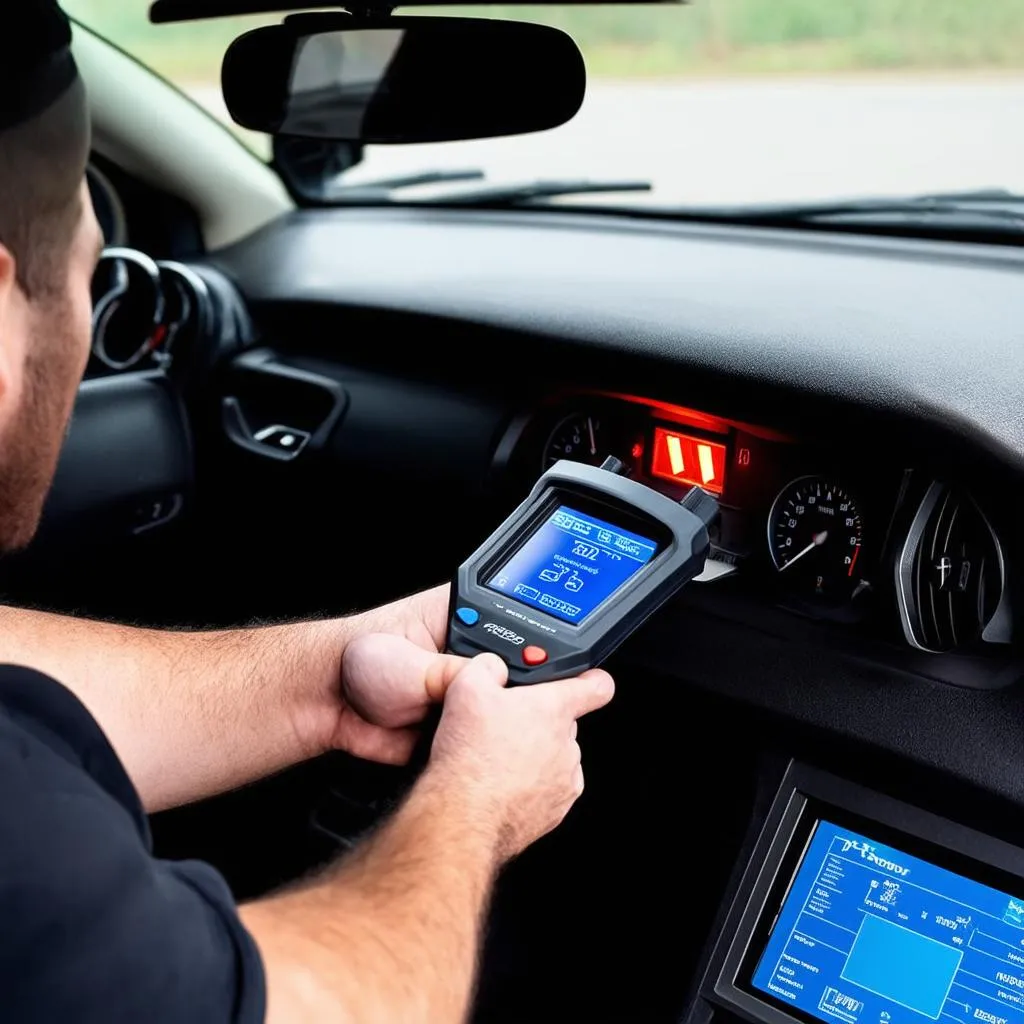You’re at the dealership, shiny new car smell filling your nostrils, and the excitement of trading in your old ride is palpable. But a tiny seed of doubt creeps in. Did you remember to clear that check engine light? Will they even notice that little “hiccup” your car has had lately? More importantly, do car dealers run OBD-II scans on trade-ins?
Let’s dive into this question and separate fact from fiction, revealing the truth behind those dealership doors.
Decoding the Dealer’s Playbook: To Scan or Not to Scan?
Just like a mechanic uses a stethoscope to listen to your car’s heartbeat, an OBD-II scanner is their tool to understand its inner workings. By plugging into your car’s computer, it reveals hidden codes that tell a story of its health and history.
So, do dealers use this tool when sizing up your trade-in? The answer, like most things in life, is not a simple yes or no. It’s more nuanced than that.
The Case for Scanning:
From a dealer’s perspective, running an OBD-II scan makes good business sense for a few reasons:
- Unveiling Hidden Issues: A scan can reveal underlying problems that aren’t immediately obvious. This helps them avoid surprises down the road and accurately assess the car’s true value.
- Pricing Power: Knowing the car’s complete history allows dealers to offer a fair trade-in value, minimizing their risk and maximizing their potential profit.
- Building Trust (Or So They Say): Some dealers promote their use of OBD-II scans as a sign of transparency and commitment to selling quality used cars.
“In a competitive market, knowledge is power,” explains John Miller, a used car sales manager with 20 years of experience. “An OBD-II scan gives us that edge, allowing us to make informed decisions and provide our customers with the best possible value.”
The Case Against Scanning:
However, not all dealers perform OBD-II scans on every trade-in. Here’s why:
- Time and Cost: Running a scan on every single trade-in can be time-consuming and may not be cost-effective, especially for high-volume dealerships.
- Negotiation Tactic: Some dealers might intentionally skip the scan, hoping to uncover potential issues during their own inspection and use it as leverage to negotiate a lower trade-in price.
- Overconfidence: Dealers might feel confident in their ability to spot problems visually and through a test drive, deeming a scan unnecessary.
This uncertainty can leave you feeling like you’re navigating a used car labyrinth blindfolded.
 OBD-II Scan
OBD-II Scan
What Does This Mean For You?
The lack of a definitive answer shouldn’t be cause for panic. Instead, see it as an opportunity to take control of the situation and approach the trade-in process with confidence.
Tips for a Smooth Trade-In Experience:
- Be Proactive: Get your car checked by a trusted mechanic and obtain a pre-inspection report. This gives you an independent assessment of your car’s condition and provides leverage during negotiations.
- Ask the Right Questions: Don’t be afraid to ask the dealer directly if they run OBD-II scans on trade-ins. Their response, or lack thereof, can be quite telling.
- Know Your Car’s Worth: Research your car’s trade-in value using online tools like Kelley Blue Book or Edmunds. This empowers you to negotiate a fair deal, regardless of whether they run a scan or not.
The Feng Shui of Car Trading:
While not a scientific guarantee, maintaining a clean and clutter-free car, both inside and out, can create positive energy and potentially influence the dealer’s perception. Think of it as good car karma.
Frequently Asked Questions:
Q: Will a dealer reduce my trade-in value based on an OBD-II scan?
A: It’s possible. If the scan reveals significant issues, they may adjust the offer accordingly. However, minor issues might not have a major impact, especially if you have a well-maintained vehicle.
Q: Can I refuse an OBD-II scan?
A: Technically, yes. But refusing might raise suspicions and could affect their willingness to offer a fair trade-in value.
Q: Should I clear my check engine light before trading in my car?
A: While tempting, it’s not recommended. Clearing the code without addressing the underlying problem is like hiding dirt under the rug. It’s better to be upfront and address any issues transparently.
Related Questions:
- What are common OBD-II codes found on trade-in vehicles?
- How can I improve my car’s trade-in value?
- What are my alternatives to trading in my car?
 Car Dealership
Car Dealership
Need Help with Your Car’s Diagnostics?
At techcarusa.com, we’re passionate about empowering car owners with the knowledge and tools they need. If you’re facing car troubles or need help understanding your vehicle’s diagnostics, don’t hesitate to reach out. Our team of experts is available 24/7 to provide guidance and support. Contact us via WhatsApp at +84767531508.
Remember, knowledge is power in the world of car trading. By understanding the potential role of OBD-II scans, you can navigate the process with confidence and secure the best possible deal for your beloved vehicle.